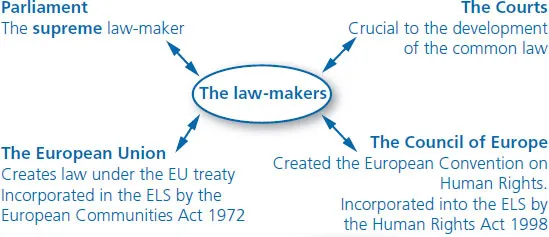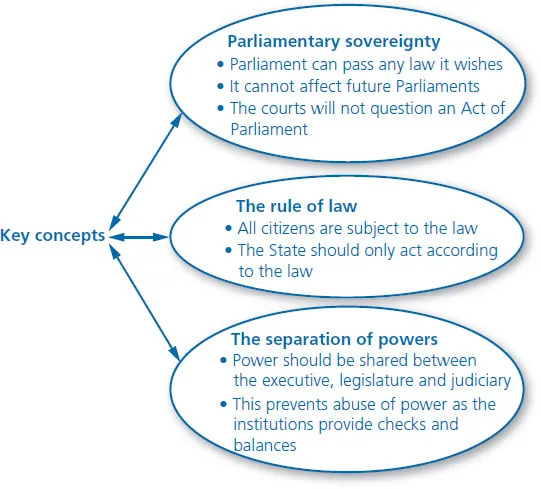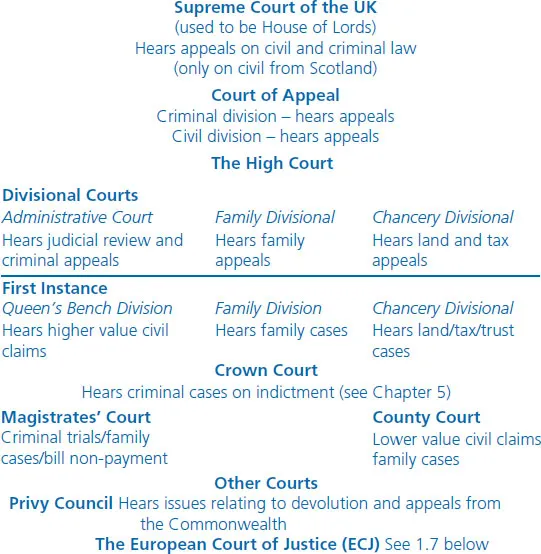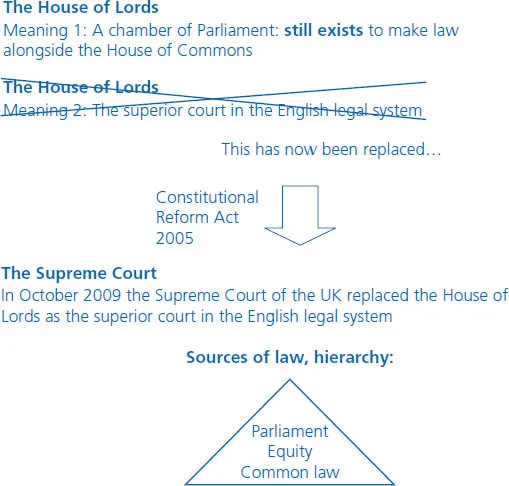
Course Notes: the English Legal System
Catherine Easton
- 174 pagine
- English
- ePUB (disponibile sull'app)
- Disponibile su iOS e Android
Course Notes: the English Legal System
Catherine Easton
Informazioni sul libro
The ideal companion to developing the essential skills needed to undertake the core module of English Legal System as part of undergraduate study of law or a qualifying GDL/CPE conversion course. Providing support for learning and revision throughout, the key skills are demonstrated in the context of the core topics of study with expertly written example sets of notes, followed by opportunities to learn and test your knowledge by creating and maintaining your own summaries of the key points. The chapters are reinforced with a series of workpoints to test your analytical, communication and organisational skills; checkpoints, to test recall of the essential facts; and research points, to practice self-study and to gain familiarity with legal sources. "Course Notes: the English Legal System" is designed for those keen to succeed in examinations and assessments with view to taking you one step further towards the development of the professional skills required for your later career. In addition, concepts are set out both verbally and in diagrammatic form for clarity, and the essential case law is displayed in a series of straightforward and indisposable tables illustrating how best to analyse and compare legal points as expressed by the opinions of the authorities in each case.To check your answers to questions examples are provided online along with sample essay plans and web links to useful web sites and sources at www.unlockingthelaw.co.uk, making this the ideal resource to guide you through the demands of compiling and revising the information you will need for your exams.
Domande frequenti
Informazioni
- Common law: the law held in judges’ decisions
- Equity: a source of law based on fairness
- Legislation: Acts of Parliament and secondary (delegated) legislation
- European Union law
- The European Convention on Human Rights.




- It can mean the law which applies to all.
- It can mean the law developed through judgments handed down in cases.
- Before 1066: there was no uniform law in the country.
- After 1066: a uniform, central system was developed with judges who travelled the country (named Curia Regis).
- This law applied to all (was ‘common’ to all).
- But if you did not lodge the correct paperwork (writ) then you could not have a remedy.
- So some people in this position took their case to the King.
- The King appointed a Lord High Chancellor to hear these cases in the Court of Chancery.
- The principles developed in this court became known as equity.
- The two court systems were fused together by the Judicature Acts 1873–75.
- We know that the common law and equitable principles can now be administered in all courts.
- As equity was created to provide redress where there was none, it will prevail over the common law in case of conflict. An Act of Parliament would prevail over both of these sources (see 1.6).
- Equitable principles are based upon equality and fairness (you will study equity in more detail in, for example, the law of trusts).
- Equity has its own remedies, such as an injunction which can force or stop an act being performed.
- Equity will intervene where the law itself would produce absurd or unfair results.
- Primary: Acts of Parliament, also known as statutes.
- Secondary or delegated or subordinate: This is where Parliament delegates law-making powers to, for example, a minister or a local authority (see below).

- Public Bills: Bills drafted by the Government (the majority of Bills).
- Private Members’ Bills: Bills prepared by MPs who have been given the chance to propose a new law. Acts passed from PrivateMembers’ Bills include the Abortion Act 1967 and the Sustainable Communities Act 2007.The final type of Bill usually applies only to the body who proposed it:
- Private Bills: These are usually proposed by a body such as a large company or a local authority and usually only affect this actual organisation itself, e.g. the University of Manchester Act 2004.

- First Reading
- Second Reading
- Committee Stage
- Report Stage
- Third Reading.